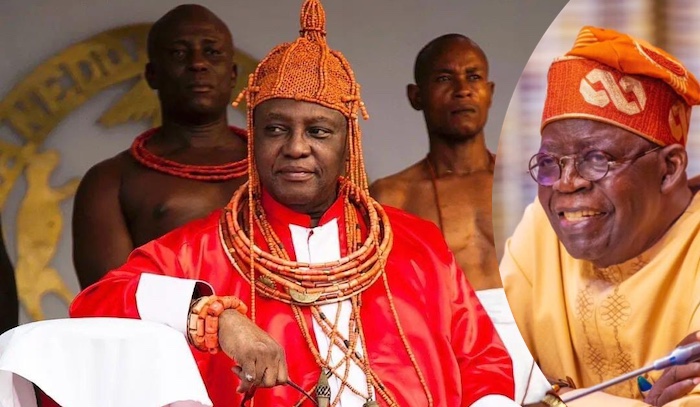
In August 2025, THE CONCERNED EDO DIASPORA ASSOCIATION consisting of no fewer than 30 associations of elders and all Edo Tribes published full page statements in four main newspapers in Nigerian of a signed petition to President Tinubu stating their unequivocal objection to the proposed legislation which seeks to establish the Sultan of Sokoto and the Ooni of Ife as permanent co-chairmen of the National Council of Traditional Rulers of Nigeria (NCTRN).
The Edo Diaspora association swung into action after receiving news that a bill to establish a national council for traditional rulers has scaled its second reading in the Nigerian Senate with a clause in the bill that empowers the Ooni of Ife and the Sultan of Sokoto to be over and above other traditional rulers in the country, designating them as permanent co – chairmen of the new Council in the purposed bill.
The purposed bill seeks to constitutionally recognize the roles and importance of traditional rulers for the overall peace and development of Nigeria. The bill’s general principles were presented by the Senator representing Jos District, Simon Lalong. Lalong explained that the bill was first introduced on October 8, 2024, arguing that traditional authorities were highly influential in Nigerian governance before the 1914 amalgamation, they are the custodians of Nigerian culture, religion and values, and they were the rulers of Nigeria during the “indirect rule” under the British colony between 1910 and 1960.
Whilst the bill was initially welcomed, the clause in the bill that empowers the Ooni of Ife and the Sultan of Sokoto to be over and above other traditional rulers in the country has subjected it to widespread criticism, attack and rejection.
THE CONCERNED EDO DIASPORA ASSOCIATION further stated that Nigeria is an ethnically diverse nation comprising of numerous historically autonomous kingdoms and traditional institutions, each commanding significant ancestral, cultural, and political legitimacy within its geo-cultural sphere. Prominent among these is the ancient Benin Kingdom, whose monarchy predates the amalgamation of Nigeria in 1914 and whose influence historically extended across Southern Nigeria and into present-day Republic of Benin and Ga tribe of Ghana until the British invasion of 1897. We call on the President, National and State Assemblies to reject this bill and uphold egalitarianism and true federalism, ensuring if there is need for NCTRN chairmanship, it should be rotational according to its traditional, historical and geopolitical prominence.
OHANAEZE NDIGBO followed suite releasing a statement stating the bill to create a role for traditional rulers in government could lead to a bitter power tussle. They have rejected the proposal outright, describing it as unjust, ethnocentric and a direct affront to the principles of equity, fairness, and federal character enshrined in the Nigerian Constitution. Such a law has no place in a pluralistic nation like Nigeria. “Ohanaeze Ndigbo, therefore, calls for the urgent withdrawal of the bill and the need to review it in consideration of ethnic differences, cultural sensitivity, geopolitical balance, inclusive governance and equitable representation.
Similarly, the Middle Belt Forum, MBF, equally opposed the clause that elevates the Sultan of Sokoto to such a position in the proposed traditional rulers’ council. The group noted that its southern counterparts were free to determine the fate of the Ooni of Ife but it clearly rejected and condemned the elevation of the Sultan of Sokoto as a permanent co-chairman of the proposed Council. A statement by its national spokesman, Luka Binniyat, said the rejection was anchored on strong historical, cultural, constitutional, and moral grounds, which includes the fact that the Sokoto Sultanate is historically junior to Middle Belt monarchies
The Concerned Hausa Stakeholders have equally rejected the bill describing it as ethnically biased, historically misleading, and constitutionally indefensible. It argued that Nigeria is not a two-ethnic federation of Fulani and Yoruba but a multi-ethnic republic where equal representation, historical truth and federal character must be respected. The group also argued that the Sultan of Sokoto is a religious leader and not a traditional ruler; therefore, he cannot represent the Hausa people in that cultural sense.
In parts of the Yoruba region, objections have also emerged, with some insisting that the Alaafin of Oyo, rather than the Ooni of Ife, should represent the Yoruba in any such council.
Civil society voices have suggested that if the council must be established, membership should rotate among traditional leaders from different regions to ensure fairness, inclusivity, and equal representation, rather than granting permanent seats to specific monarchs. The Senate continues to deliberate on the bill, but analysts warn that without consensus on representation, the move could deepen existing divisions rather than foster unity.
Join us this Saturday, 06 September 8 a.m-10a.m, on the Right Direction Radio Show on RTM Radio.Net, London 89.9FM where we will be talking to members of the Concerned Edo Diaspora Association.
The Editor
